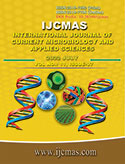


 National Academy of Agricultural Sciences (NAAS)
National Academy of Agricultural Sciences (NAAS)

|
PRINT ISSN : 2319-7692
Online ISSN : 2319-7706 Issues : 12 per year Publisher : Excellent Publishers Email : editorijcmas@gmail.com / submit@ijcmas.com Editor-in-chief: Dr.M.Prakash Index Copernicus ICV 2018: 95.39 NAAS RATING 2020: 5.38 |
Obesity adds a significant burden to obese dogs, as well as the veterinary health-care systems. Bariatric surgery is the most effective treatment for severe obesity and its comorbidities. Twenty four obese dogs (8 controlled, 8 castrated, 8 non-castrated) were recruited into the study. The aim of this study was to evaluate sleeve gastrectomy as bariatric intervention in groups under study by estimating body weight and evaluating blood glucose and insulin levels in castrated, non-castrated obese dogs. Postoperatively, we evaluated the body weight in the groups and estimated the blood glucose and insulin levels in the castrated, non-castrated obese dogs at 1, 2, 3, 4, 5, 6, 7, 8, 9, 10, 11, 12, 13, 14 weeks after the operation. After sleeve gastrectomy, the average body weight in control, castrated obese dogs was higher than non-castrated obese dogs with a significant difference at a significant level (.05). Post operation, the average blood glucose and insulin level in the blood are higher in castrated obese dogs than in non-castrated obese dogs, with statistically significant differences at a significant level (.05). After the operation, we observed a general decrease in the average body weight, blood glucose and insulin levels in the groups with a clear increase in the average body weight, blood glucose and insulin levels in castrated obese dogs than in non-castrated obese dogs.
 |
 |
 |
 |
 |